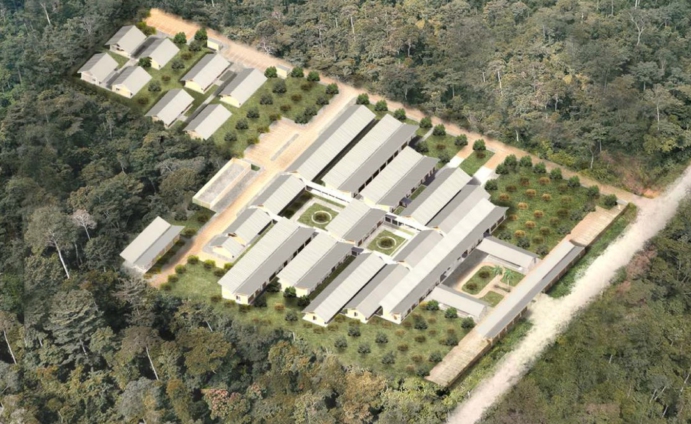In Ghana, a striking disparity in geographical access to healthcare has been unveiled in the 2022 Social Development Outlook published by the Institute of Statistical, Social and Economic Research (ISSER).
The report indicates that up to 73% of residential structures in rural areas lack a health facility within a five-kilometre radius, in stark contrast to the 24% recorded in urban areas.
The situation is particularly concerning in the northern part of the country, where more than 40% of residential structures in 10 districts lack access to healthcare within the specified radius.
The Sekyere Afram Plains District faces the greatest deficit, with 55% of its residential structures lacking adequate healthcare access.
The report highlights a challenging scenario for residents in rural areas who face significant hurdles in obtaining timely and essential healthcare services.
The lack of accessible health facilities within a reasonable distance poses a grave concern for the overall well-being of these communities. Furthermore, the completion of Agenda 111, the government's ambitious health infrastructure intervention, has been delayed by five years, making it less likely that this issue will be addressed in the near future.
In addition to the access disparity, the report touches on the state of malaria in Ghana. While there has been a consistent decrease in malaria endemicity over the past decade, efforts in malaria prevention seem to have stagnated, partly due to the lack of progress in the ownership and use of insecticide-treated nets (ITNs).
The Ghana Malaria Indicator Survey conducted in 2019 revealed a negative correlation between household wealth quintile and malaria infection among children under five years old, highlighting the impact of poor quality housing and surroundings on disease transmission.
Regarding HIV/AIDS and zoonotic diseases (diseases that can be transmitted to humans from animals), Ghana's "Treat for All" policy, implemented since 2016, has proven effective in reducing HIV infections and the disease burden.
However, there remains a mismatch between the prevalence of HIV/AIDS and the distribution of antiretroviral therapy (ART). District and regional inequities in ART coverage, relative to prevalence at sub-national levels, have become evident.
Additionally, there has been a recent upsurge in zoonotic diseases, further emphasising the need for comprehensive public health measures.
In light of these concerning findings, ISSER has put forward several policy recommendations to address the existing challenges and improve healthcare in Ghana:
- Improve Housing Quality and Environmental Health: Efforts should focus on enhancing housing quality and environmental health, particularly for vulnerable households and overcrowded inner-city neighbourhoods, to combat malaria and other diseases associated with poor living conditions.
- Mitigate Malaria Vaccine Hesitancy: The Ghana Health Service (GHS) should proactively address any potential vaccine hesitancy related to the malaria vaccine by learning from lessons regarding COVID-19 vaccination coverage and implementing effective communication strategies.
- Evidence-Based Distribution of ART: Stakeholders, including the Ghana AIDS Commission, Ministry of Health, Ghana Health Service, and donor community, should ensure that the distribution of antiretroviral therapy is informed by the prevalence and incidence of the infection at sub-national levels, reducing inequities in coverage.
Strengthen Preventive Measures for Zoonotic Diseases: Stakeholders should intensify preventive public health measures, including sustained public communication, behavioural change initiatives, and educational campaigns, to reduce the transmission of zoonotic diseases and protect public health.
Latest Stories
-
Man remanded for uploading nude videos of a lady he lured into a relationship
2 hours -
Explainer: What is the Cash Waterfall Mechanism?
2 hours -
Survivors of child trafficking overcome adversity, excel in tertiary education
3 hours -
Confront the barriers to your progress – Professor Lydia Aziato challenges the youth
3 hours -
Expertise France leads EU-funded initiative empowering African Journalists to combat human trafficking
4 hours -
Ghana Grows Programme empowers Ghanaian youth through Youth Policy Dialogue
4 hours -
Eastern NDC raises GHS5.4m to support Mahama’s 2024 campaign
4 hours -
Kumawood actress Akyere Bruwaa condemns death rumours
4 hours -
Ghana Institution of Engineering calls for proactive measures to prevent flood disaster
4 hours -
Who pays for the extra cost? – COCOBOD CEO questions EU on new regulations
4 hours -
‘Dumsor’ will be over by end of May – Former NPP MP assures
4 hours -
Power crisis is not about money – NPP Manifesto Committee member
5 hours -
Education Minister urges graduates to embrace opportunities
5 hours -
UN rights chief ‘horrified’ by mass grave reports at Gaza hospitals
5 hours -
We need more resources to deal with flooding – NADMO
5 hours

